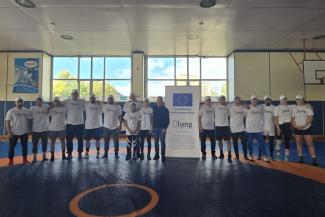Valizadeh, Mahdavi named in IOC Refugee Team for 2024 Paris Olympics
Thursday, May 2, 2024 - 16:53 By United World Wrestling Press

LAUSANNE, Switzerland (May 2) -- Wrestlers Iman MAHDAVI and Jamal VALIZADEH were among the 36 athletes from 11 different countries across 12 sports were named by International Olympic Committee (IOC) President Thomas Bach to the IOC Refugee Olympic Team for Paris 2024.
Mahdavi and Valizadeh were selected to the IOC Refugee Olympic Team through the support of the Refugee Athletes Scholarship Programme, funded by the IOC's Olympic Solidarity program. The two wrestlers are supported by the hosting national federations of Italy and France and the United World Wrestling Development Department for Technical Assistance and participation in UWW events.
At the 2024 Paris Games in August, the two will be representing different styles with Valizadeh gearing up for Greco-Roman 60kg and Mahdavi set to compete in Freestyle 74kg.
Mahdavi was born to be a wrestler, following in his father's footsteps. Through his unwavering love for the sport and fierce determination, it was no surprise that success followed the now-29-year-old. He won seven junior national titles and quickly climbed the ranks in his nation.
But in 2020, that was all derailed as Mahdavi fled his country and became a refugee. He moved to Milan, Italy, and applied for asylum. He found a full-time job in Milan and friends that soon became family. Through all the uncertainties, one thing remained – his love for wrestling.
Mahdavi found a practice facility in Milan, one with high-level training partners that helped rekindle his Olympic hopes. He worked out five days a week, and after three years of struggle, Mahdavi returned to the mat under the UWW Refugee team.
Mahdavi's UWW Refugee team debut came at the 2023 European Championships, where he registered a 12th-place finish at 74kg, one of the most competitive brackets of the tournament. After two months of tweaks and improvements, Mahdavi achieved a career-best result – a bronze medal at the City of Sassari Tournament. He continued taking the mat every chance he had, wrestling in the Poland Open and World Championships, where he finished in fifth and 18th, respectively.
This year, Mahdavi's competition calendar will feature three events – two of which will be tune-up competitions. He already participated in the European Championships and will use the World OG Qualifier (May 11-12) as a warm up competition for the Paris Games, where he will compete August 9-10.
It is to be noted that Mahdavi will be in Istanbul on a participating basis and not for qualification. The same is true for Valizadeh who will compete in Istanbul but not to qualify.
Like Mahdavi, Valizadeh shared a similar love for wrestling from a young age. He became one of Iran's brightest talents through his hard work and commitment to wrestling.
Despite having a bright future in the sport, Valizadeh was forced to put wrestling in the rearview and leave Iran in 2014 for a better life. He ended up in Turkiye, where he worked nearly 16 hours a day to make ends meet.
But still, Valizadeh knew there was no way he could reach his ultimate goal – the Olympic Games – living in Turkiye.
After two years, Valizadeh departed Turkiye by boat and arrived in France where he trains with the French Greco-Roman National Team and lives in Metz.
Although he had been away from the sport for many years, Valizadeh regained his passion for wrestling and returned to the mat in 2023 as a UWW Refugee team member. He competed six times last year, including the European and World Championships.
This season, in addition to his appearances at the Henri Deglane and European Championships in GR 60kg, Valizadeh will participate, for experience, in the World OG Qualifier (May 9-10) before wrestling on home soil at the Paris Olympic Games, August 5-6.
For more on the IOC Refugee Olympic Team, visit olympics.com.


Share your thoughts.
Comments